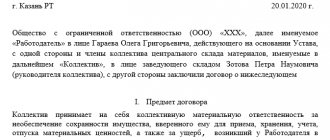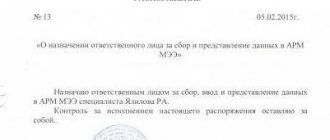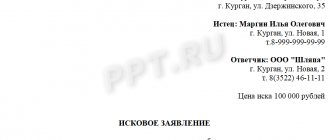Time limits for bringing disciplinary action against police officers
Disciplinary action is a punishment imposed on an employee in connection with his violation of labor discipline.
For each disciplinary offense, only one disciplinary sanction can be applied. (Article 194 of the Labor Code of the Russian Federation). A disciplinary sanction can be lifted from an employee earlier at the initiative of the administration, at the request of the employee himself, at the request of his immediate supervisor or a representative body of the labor collective (Article 194 of the Labor Code of the Russian Federation) No. 342-FZ “On service in the internal affairs bodies of the Russian Federation and amendments to certain legislative acts of the Russian Federation" provide for a special procedure for applying penalties to employees of internal affairs bodies for non-compliance with restrictions and prohibitions and failure to fulfill duties established for the purpose of combating corruption.
The procedure for applying incentive measures to employees of internal affairs bodies, provided for in paragraphs 1 - 6 and 9 of part 1, parts 2 and 3 of Article 48 of this Federal Law, is established by the federal executive body in the field of internal affairs. 1.1. An employee of internal affairs bodies who has a disciplinary sanction imposed on him in writing by order of the head of the federal executive body in the field of internal affairs or an authorized manager may be subject to an incentive measure only in the form of early lifting of a disciplinary sanction previously imposed in writing. (Part 1.1 introduced by Federal Law dated July 3, 2016 N 300-FZ) 2.
A disciplinary sanction cannot be imposed on an employee of the internal affairs bodies after six months from the date of commission of the disciplinary offense, and based on the results of an audit or inspection of financial and economic activities - after two years from the date of the commission of the disciplinary offense.
The specified periods do not include periods of temporary incapacity for work of the employee, being on vacation or on a business trip, as well as the time of criminal proceedings. 8. Before imposing a disciplinary sanction, an explanation in writing must be required from the internal affairs officer who is being held accountable.
We invite you to familiarize yourself with: Sample design of an insert in a work book 2019
But it is also possible to avoid the prescribed punishment if it or the violation was discovered after a long time, or management did not take steps to punish the culprit in time, since there are certain statutes of limitations for bringing disciplinary action, after which the employee cannot be subject to punishment.
Request for an explanation. After identifying the fact of committing a disciplinary offense, or receiving relevant information, the employer’s representative must request a written explanation from the civil servant about the circumstances of the act he committed. The need to obtain such an explanation is a guarantee of the legality of bringing a civil servant to disciplinary liability.
What is the validity period of a disciplinary sanction?
As soon as the penalty is lifted (either automatically or early), it is no longer possible to apply the consequences of a repeated violation of labor discipline. But this does not mean that the employer should always turn a blind eye to previous violations - this may well be taken into account when choosing the type of penalty. For example, instead of a verbal reprimand, the employee may be reprimanded. However, this is a subjective approach that does not meet the requirements of the law, and, accordingly, can be challenged if the employer does not voice other reasons for his choice. While a disciplinary sanction is in effect, the commission of a new violation by an employee entails more severe consequences for him. For example, clause 5, part 1, art. 81 of the Labor Code of the Russian Federation considers failure to fulfill his duties to be one of the sufficient grounds for dismissal of an employee, provided that he has a valid disciplinary sanction. True, only the employer decides whether to apply more stringent measures to an employee who already has a valid penalty. He can exercise this right - and then, following the reprimand, the employee can be fired, or he can give the employee another chance by issuing a second reprimand. The validity period of the reprimand in this case will be counted from the moment the last penalty was announced.
Please note => Collection of housing and communal services debt from a minor
Free legal assistance
Thus, the following are regarded as mitigating circumstances (clause 12 of the Letter in question): – violation by an employee of the requirements of anti-corruption legislation for the first time; – impeccable compliance by an employee in the reporting period with other restrictions, prohibitions, requirements, performance of duties established for the purpose of combating corruption ( It is recommended to determine the presence of this circumstance by obtaining data characterizing him from the employee’s immediate supervisor);
– voluntary reporting of a complete violation of the requirements of the anti-corruption legislation to the unit for the prevention of corruption and other offenses before the start of the inspection provided for by Decree of the President of the Russian Federation of September 21, 2009 N 1065; – assistance of the person being inspected in the activities carried out during the inspection, aimed at a comprehensive study of the subject of the inspection. In paragraph
When applying disciplinary measures, it is necessary to take into account the nature of the corruption offense committed, its severity, the circumstances in which it was committed, the employee’s compliance with other restrictions and prohibitions, requirements for the prevention or resolution of conflicts of interest and the fulfillment of duties established for the purpose of combating corruption, previous performance employees of their official duties.
Penalties for corruption offenses are applied no later than one month from the date of receipt of information about the commission of a corruption offense by a civil servant. This period does not include the period of temporary incapacity for work of the employee, his stay on vacation, in other cases of his absence from service for valid reasons, the time of conducting an audit and considering its materials by a commission for resolving conflicts of interest.
Time limit for appealing a disciplinary sanction in court
He believed that the internal inspections were carried out illegally, and the orders issued on the basis of the inspection findings were also illegal.
Well, it’s probably not the mayor who is mainly to blame here, but his appointee, the first deputy head of the city, Mikhalkov, who oversees the legal department of the administration. Such “forgetfulness” in appealing decisions always happened when “winning” cases had to be lost. For this, no one will be held accountable for negligence, excess or abuse!
It would seem that material reasons should have more weight. However, it is not. Article 192 of the Labor Code obliges to take into account the severity of the offense and the circumstances of its commission. This is all subjective. If employees are caught drinking coffee outside of their lunch break, one manager will confine himself to a reprimand, and another will fire them.
This is important to know: Suspension of enforcement proceedings for alimony at the request of the claimant
Statute of limitations for bringing disciplinary action against an employee
For example, by order of the Ministry of Justice of Russia, instructions were approved on the procedure for applying the regulation “On service in the bodies of the Ministry of Internal Affairs of the Russian Federation...” dated 06.06.2005 No. 76 (hereinafter referred to as the Instructions), containing penalties not provided for by the Labor Code of the Russian Federation.
We invite you to familiarize yourself with: Brief appeal in a civil case: sample, form
Often, employers use this provision of the law as a lever of pressure on their employees who decide to go on strike and not show up for work because of this. Of course, absence from work without presenting a supporting document will be regarded as absenteeism. However, participation in a strike, according to Art.
Appealing a disciplinary sanction from the police
Federal legislation may provide for other types of disciplinary penalties. The employer does not have the right to expand the established grounds, including by issuing local regulations. One of the most common types of non-compliance with this requirement is the introduction of certain financial penalties that are imposed on an employee if he commits an offense. There are no exceptions or restrictions for the exercise of this right. If you have been given an unfair reprimand, in your opinion, feel free to write a complaint and defend your rights.
This is important to know: Collecting a common debt from an ex-spouse: solution
This section will be filled with reviews and generalizations of judicial practice in various categories of civil, criminal cases, and cases of administrative offenses heard in the regional courts.
Attention: after a reprimand is announced, you can appeal it within the first three months! This period is calculated from the day when you received a written order of reprimand for review. Any individual in an employment relationship must not only fulfill his obligations to the employer, but also comply with the basic provisions of labor discipline established in the organization.
The court invited the Department of the Ministry of Internal Affairs of Russia for the Ulyanovsk Region to participate in the case as a co-defendant. Federal laws, charters and regulations on discipline (part five of Article 189 of the Labor Code) may also provide for other disciplinary sanctions for certain categories of employees.
Statute of limitations for disciplinary offenses in the Ministry of Internal Affairs
Local acts of the Employer, in particular provisions on remuneration or provisions on bonuses, may stipulate that employees with outstanding disciplinary sanctions are not subject to bonuses, which does not contradict current legislation and does not violate the rights of employees.
Disciplinary action must be imposed in accordance with Art. 193 of the Labor Code of the Russian Federation, i.e. a certain procedure for imposing a disciplinary sanction must be observed. If within a year from the date of application of the disciplinary sanction the employee is not subject to a new disciplinary sanction, then he is considered to have no disciplinary sanction.
How long does a severe reprimand last?
Perhaps that is why the list of penalties is split and expanded for employees of the Ministry of Internal Affairs. This list comes with a strong reprimand and serves as a sort of “Chinese final warning” before more drastic measures are taken. This means that within a year a repeated violation may end: Citizens employed by the Ministry of Internal Affairs are more oriented in their work to special laws relating to their activities. The main difference from the majority of workers is that the military and employees of the Ministry of Internal Affairs do not work, but serve. To some extent, this means a stricter attitude towards dereliction of duty and an increased responsibility before the law and society.
Please note => Compensation for benefits for heating and lighting for labor veterans in Penza
Statute of limitations for bringing a military personnel to disciplinary liability
In the civil service, a disciplinary sanction is applied immediately after the discovery of a disciplinary offense, but no later than one month from the date of its discovery, not counting the period of temporary incapacity for work of a civil servant, his stay on vacation, other cases of his absence from service for good reasons, as well as the time of service checks.
https://www.youtube.com/watch?v=Pxu-zLvpEyg
production is the activity of subjects of linear authority regulated by legal norms in the application of disciplinary sanctions. We can also say this: proceedings are the activities of authorized entities regulated by law, aimed at bringing the perpetrators to disciplinary action.
Main types of disciplinary sanctions and their application
- frequent cases of violation of work regulations (being late, leaving the workplace before the hour established by internal regulations, increasing the time allotted for a lunch break, absenteeism, conflicts with employees and management, or appearing drunk);
- confirmed fact of intentional or unintentional damage to work tools or property;
- confirmed fact of theft of public or private property;
- violation of labor discipline leading to injury/death of people.
- Conduct an investigation to identify the causes of the misconduct and the perpetrators.
- The decision to apply punishment is made by the immediate superior of the offender or by higher management (after receiving the appropriate report).
- The report is submitted to superiors no later than 10 days from the moment the misconduct is discovered.
- The result of the proceedings and the basis for deciding whether punishment is necessary is the protocol.
24 Dec 2021 marketur 2391
Share this post
- Related Posts
- In what cases is a railway ticket paid by the pension fund?
- Calculation of VAT for payment to the budget example
- What insignia do you need to have to receive the title of labor veteran for a teacher?
- The title Veteran of Labor is awarded to Pensioners of the Federal Pension Service
How to appeal the punishment of employees of the Ministry of Internal Affairs in court?
The grounds for applying dismissal are listed in. In accordance with paragraphs 5-10 of this article, these include several types of violations of discipline.
A penalty imposed by an order cannot be lifted orally. Incentives and disciplinary sanctions are announced to an employee of the internal affairs bodies in person, before the formation or at a meeting (meeting). Before imposing a penalty, a written explanation must be required from the internal affairs officer who is being held accountable.
The approval sheet does not indicate the official who introduced him to the order. Receiving his salary in April, he learned that the salary was not paid in full - without a bonus and assumed that either he was deprived of the bonus or would be paid later, as had happened before. Direct superiors are superiors to whom employees of internal affairs bodies are subordinate in their service, at least temporarily. The direct superior closest to the subordinate is his immediate superior. Employees of internal affairs bodies who are not subordinate to each other in service may be senior or junior.
Article 42. Courts of honor In internal affairs bodies, courts of honor are created, respectively, for ordinary and junior commanding personnel, middle commanding personnel, senior and senior commanding personnel. Failure to comply with such rules may result in disciplinary action, the consequences of which range from loss of bonuses to dismissal.
This is important to know: Collection of alimony debt through the court
I quoted this norm to you so that you can figure out whether the deadlines for applying a disciplinary sanction have been violated.
He does not agree with the orders imposing disciplinary sanctions and dismissal on him, as well as the conclusions of the internal audits that served as the basis for issuing the appealed orders.
Appealing a disciplinary sanction of the Ministry of Internal Affairs
Visitors to the legal consultation asked 562 questions on the topic of “collection.” On average, the answer to a question appears within 15 minutes, and to a question we guarantee at least two answers that will begin to arrive within 5 minutes!
The period for consideration of a case regarding a disciplinary sanction is 10 days. She has the right to satisfy the requirements in full, partially or refuse. The decision of this body is considered procedurally independent: it is not subject to approval by the owner of the enterprise or anyone else. Those dissatisfied with the determination of the CCC have the right to appeal it to the court within the same 10-day period. If we are talking about a government agency, the cancellation of a decision on disciplinary action in the form of dismissal presupposes the opportunity to continue working in the same place. To wait until the conflict subsides or leadership rotates, you can take sick leave, time off, leave to care for a sick relative, or file a request for transfer. Rarely will an official risk repeatedly dismissing a person from the civil service without reason.
Less serious offenses are recognized as a violation of order by decision of the administration of the institution where the perpetrator works.
Plaintiff Zakharov A.A. brought a claim against the Department of the Ministry of Internal Affairs for the city of Pyatigorsk to recognize as illegal and cancel the orders of the head of the Department of the Ministry of Internal Affairs for the city of Pyatigorsk dated DD.MM.YYYY No. on the imposition of a disciplinary sanction, a severe reprimand and an order from DD.MM.YYYY on removal from office.
Hiring a new employee involves familiarizing him with the requirements of labor discipline, which he must subsequently comply with throughout his entire activity.
In relation to the Ministry of Internal Affairs of Russia, the issues of bringing its employees to administrative responsibility are perhaps one of the most discussed, since in connection with the optimization of police activities they cannot go unnoticed by civil society.
A disciplinary sanction cannot be applied later than six months from the date of commission of the offense, and based on the results of an audit, inspection of financial and economic activities or an audit - later than two years from the date of its commission.
Appealing a disciplinary sanction is a chance for an employee whose rights have been infringed to protect his legitimate interests. To succeed, you need to write a competent appeal and contact the authorized body, observing the deadline.
Labor disputes are one of the most common categories of civil cases heard in Russian courts. Most often, a claim is initiated by an employee who was unfairly fired or punished, not paid a salary or deprived of a bonus.
An appeal against a disciplinary sanction to the head of a higher customs authority is carried out by the employee within three months from the date of familiarization with the order imposing a disciplinary sanction on him, and on issues of dismissal - within a month from the date of delivery of a copy of the dismissal order.
A. questions for which the plaintiff must provide written explanations regarding the failure to enter anonymous messages into the KUSP. However, instead of requesting an explanation from the plaintiff, an act of refusal to give explanations was drawn up from DD.MM.YYYY, which does not correspond to reality. The signatories, who were repeatedly summoned to court as witnesses, did not appear.
The program was developed jointly with Sberbank-AST CJSC. Students who successfully complete the program are issued certificates of the established form.
To recover from the Department of the Ministry of Internal Affairs of Russia for the Kurgan Region in favor of Cheremukhin in compensation for moral damage 1000 rubles. Unemployed S. and K. drank wine in the entrance of the house. Then, going out into the street, they shouted loudly and pestered passers-by.
The analogue of the CCC in government agencies is the Commission on Service Disputes. Unlike CTS, it is much more influential. The features of its functioning are prescribed by Federal Law No. 79.
The procedure for registering a misdemeanor and the period of validity of the penalty are established by Art. 193 Labor Code of the Russian Federation. When registering you need to consider:
- degree of danger;
- circumstances;
- results of the employee’s work (behavior) before the violation.








